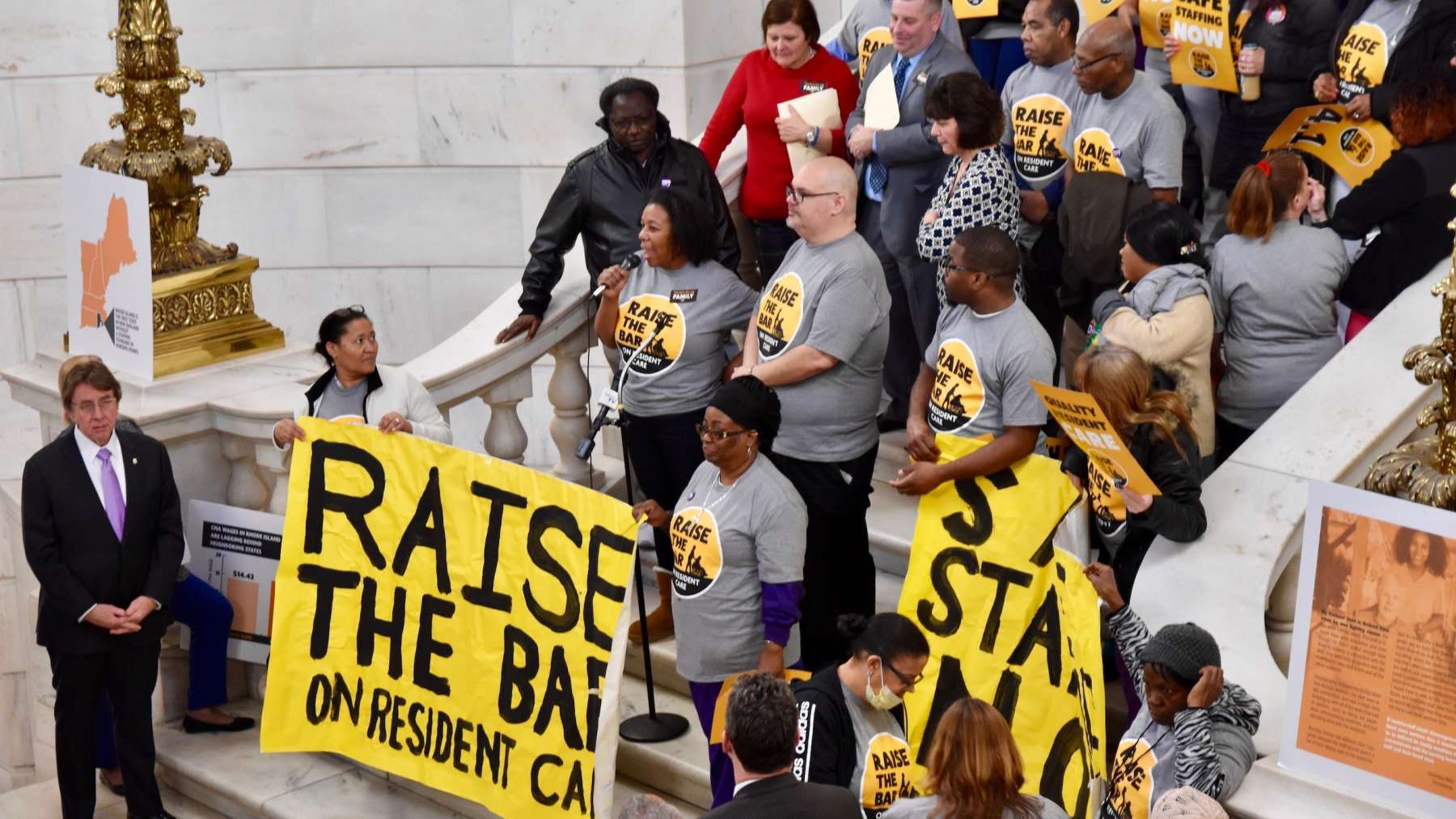Hundreds rally at State House to support The Nursing Home Staffing and Quality Care Act
“I love taking care of residents but short staffing and low wages make my job next to impossible some days,” said Victoria Mitchell, a certified nursing assistant from Hopkins Manor in North Providence who has been a caregiver for 23 years. “Young people do not want to do this work for such low pay when they can get a job
February 6, 2020, 2:40 pm
By Uprise RI Staff
“I love taking care of residents but short staffing and low wages make my job next to impossible some days,” said Victoria Mitchell, a certified nursing assistant from Hopkins Manor in North Providence who has been a caregiver for 23 years. “Young people do not want to do this work for such low pay when they can get a job elsewhere without all the extra stress. We need better wages, more training and recognition that our work matters.”
The Nursing Home Staffing and Quality Care Act will set minimum staffing standard of 4.1 care hours of care, raise wages for caregivers and provide needed training opportunities
Hundreds of nursing home family members, caregivers and community supporters with the Raise the Bar on Resident Care coalition rallied at the State House on Wednesday to support new legislation aimed at tackling the staffing crisis facing nursing homes across the state.
For months, the Raise the Bar coalition has been urging lawmakers to address the lack of safe staffing standards in Rhode Island nursing homes as Rhode Island is the only New England state and one of only 11 other states across the country with no minimum staffing standard. Chronic short staffing drives high turnover in nursing homes, which negatively impacts the quality of care residents receive and wastes valuable resources on recruiting and training new employees and use of overtime and agency staff.
“My family experienced the heartbreak of short staffing directly while my aunt was in a nursing home,” said Antoinette Lamontagne from Cranston, “More than once I found my aunt still in bed at one o’clock in the afternoon and once she went into diabetic shock because the agency nurse could not recall if she received her insulin injection. Having your loved ones live in those conditions is completely unacceptable and change is long overdue.”
Now, Senate Whip Maryellen Goodwin (Democrat, District 1, Providence) and Representative Scott Slater (Democrat, District 10, Providence) are introducing new legislation that will:
- Establish a minimum standard of 4.1 hours of resident care per day, the federal recommendation for quality care and a figure long endorsed by experts including the American Nurses Association, the Coalition of Geriatric Nursing Organizations, and the National Consumer Voice for Quality Long-Term Care;
- Secure funding to raise wages to recruit and retain a stable, qualified workforce; and
- Invest in needed training and skills enhancement for caregivers to provide care for patients with increasing acuity and complex healthcare needs.

“Rhode Island’s population is among the oldest in the nation, and we’re getting older,” said Senator Goodwin. “We need to do all we can to ensure that residents have access to the care they need. That’s why I sponsored legislation to increase home care options last session, and why it is important that we also address nursing home caregivers. We need to ensure we have an adequate workforce and set minimum standards like most other states so that nursing home residents receive the appropriate care.”
“Like many Rhode Islanders, my family has dealt with the challenges of finding long term care for a loved one,” said Representative Slater. “All nursing home residents should be guaranteed an adequate level of care and the committed staff in nursing homes who take care of our elderly deserve a living wage.”
Low wages are a driver of the staffing crisis. The median wage for CNAs in Rhode Island is more than $1 less an hour than both Massachusetts and Connecticut and is below the income needed to to meet the basic needs of a single parent family. Without a living wage, caregivers often leave to work at other jobs – including retail and service sector – that provide higher wages than Rhode Island nursing homes.

“I love taking care of residents but short staffing and low wages make my job next to impossible some days,” said Victoria Mitchell, a certified nursing assistant from Hopkins Manor in North Providence who has been a caregiver for 23 years. “Young people do not want to do this work for such low pay when they can get a job elsewhere without all the extra stress. We need better wages, more training and recognition that our work matters.”
Short staffing and poverty wages have created a shortage of qualified caregivers positioned to meet the growing demand for long term care services. Rhode Island has the highest proportion of adults ages 85 and older in the nation, a number that will dramatically increase as the Baby Boomer generation enters the long term care system. By 2030 Rhode Island will see an increase of 100,000 residents aged 65 and over.
Raise the Bar on Resident Care is a coalition of nursing home caregivers, clergy members, community partners, nursing home residents and family members working to end the staffing crisis in Rhode Island nursing homes. Read more about Rhode Island’s staffing crisis in this report.

[From a press release]







